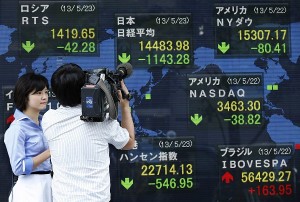
A TV cameraman shoots an electronic stock indicator outside a securities firm in Tokyo Thursday, May 23, 2013. Asian markets fell Thursday with Tokyo plunging more than seven percent as investors took profits after weak Chinese data and signs the US Federal Reserve could start tapering off its massive stimulus measures. AP PHOTO/SHIZUO KAMBAYASHI
HONG KONG—Asian markets fell Thursday with Tokyo plunging more than seven percent as investors took profits after weak Chinese data and signs the US Federal Reserve could start tapering off its massive stimulus measures.
Tokyo dropped on record volumes in the afternoon as investors panicked in the rush to take profit, with the index suffering its biggest daily percentage fall since the March 2011 earthquake-tsunami and the ensuing nuclear crisis.
Markets had earlier taken their lead from Wall Street, where stocks fell after Federal Reserve chief Ben Bernanke told Congress the Fed could scale back stimulus measures soon if economic conditions improved.
Tokyo closed down 7.32 percent, or 1,143.28 points, at 14,483.98, the heaviest plunge in terms of points since the IT bubble burst in April 2000.
Sydney slumped 1.99 percent, or 106.9 points, to close at 5,062.40. South Korean shares slid 1.24 percent, or 24.64 points, to finish at 1,969.19.
Shanghai ended down 1.16 percent, or 26.73 points, at 2,275.67, and Hong Kong dropped 2.54 percent, or 591.4 points, to finish at 22,669.68.
Tokyo plummeted after HSBC said manufacturing activity in China contracted in May for the first time in seven months, in another sign of the weakness of recovery in the world’s second-largest economy.
The British banking giant’s preliminary purchasing managers’ index (PMI) fell to 49.6 this month from a final 50.4 in April, putting it below the 50 mark that indicates contraction.
Japan’s economy minister Akira Amari said the government was not worried about the sharp decline, which represented large-scale profit-taking triggered by the weak Chinese data.
“I thought the pace of the Nikkei’s rise recently was faster than expected,” Amari said, according to Dow Jones Newswires. “The weak Chinese data prompted investors to take profits all at the same time.”
Earlier in the day, the Nikkei 225 index at the Tokyo Stock Exchange, which closed at its best level in more than five years on Wednesday, had risen 0.23 percent.
Other markets had opened down after Dow Jones Industrial Average dropped 0.52 percent to 15,307.17 after Bernanke’s comments.
He stressed that current economic conditions did not warrant an end to the Fed’s aggressive stimulus measures, and US stocks had rallied during the early part of his highly anticipated testimony.
But Bernanke told lawmakers the Fed could start reducing its $85 billion-a-month bond-buying program at one of the next few meetings. And stocks took a decisive lurch with the release of Federal Reserve meeting minutes that showed some officials had discussed curtailing bond purchases as soon as June.
“Fed Chairman Bernanke’s remarks caused jitters among global investors,” said Peng Yunliang at Shanghai Securities.
Europe’s main stock markets also slumped at the start of trading, with Frankfurt and Paris down more than 2 percent and London slumping 1.42 percent.
Selling in Japan picked up pace when the yen climbed against the dollar in Asia afternoon trade, after recent sharp declines in the value of the Japanese currency.
The dollar plunged to 101.20 yen late in Asia from 103.31 yen in New York late Wednesday.
“No one believed the yen would keep on falling and stocks would keep on rising. It is not surprising if yen-buying momentum revives at any time,” said Daisuke Karakama, a market economist at the forex division of Mizuho Corporate Bank.
Prime Minister Shinzo Abe’s pro-spending, pro-growth policies have weakened the yen more than 20 percent against the dollar over the past six months and boosted share prices to their highest level in more than five years.
The euro was at 130.36 yen late Thursday in Asia from 132.58 yen and $1.2885 from $1.2855.
Oil extended losses in Asian trade, with New York’s main contract, light sweet crude for delivery in July, dropping 63 cents to $93.65 a barrel in the afternoon. Brent North Sea crude for July delivery shed 60 cents to $102.00.
Gold was at $1,388.57 at 1000 GMT from $1,392.70 late Wednesday.
In other markets:
— Bangkok fell 1.46 percent or 23.81 points to 1,607.46.
Banpu lost 1.85 percent to 318 baht, while Bangkok Bank dropped 1.82 percent to 216 baht.
— Jakarta ended down 1.66 percent, or 86.60 points, at 5,121.40.
Telekomunikasi Indonesia lost 1.21 percent to 12,200 rupiah, while palm oil firm Sinar Mas Agro Resources climbed 2.82 percent to 7,300 rupiah.
— Kuala Lumpur lost 0.61 percent, or 10.82 points, to close at 1,773.06.
Astro Malaysia Holdings fell 3.8 percent to 3.04 ringgit, while UEM Land Holdings shed 3.3 percent to 3.26. IHH Healthcare gained 0.3 percent to 3.95 ringgit.
— Singapore tumbled 1.8 percent, or 61.20 points, to 3,393.17.
DBS Bank dropped 0.75 percent to Sg$17.15 and vehicle distributor Jardine Cycle and Carriage fell 2.5 percent to Sg$46.86.
— Manila closed down 0.96 percent, or 70.69 points, at 7,314.38.
Top-traded SM Investments fell 0.42 percent to 1,198 pesos, while Universal Robina Corp. dropped 3.10 percent to 125 pesos. Metropolitan Bank shed 2.54 percent to 134.50 pesos.
— Taipei shed 1.92 percent, or 161.01 points, to 8,237.83.
Taiwan Semiconductor Manufacturing Co. fell 3.57 percent to Tw$108.0 while leading integrated chip design house MediaTek lost 3.14 percent to Tw$370.0.
— Wellington fell 0.47 percent, or 21.59 points, to 4,588.59.
Telecom Corp. was down 1.04 percent at NZ$2.375, Contact Energy was off 1.2 percent at NZ$5.20 and Fletcher Building was up 0.71 percent at NZ$8.49.
— Mumbai fell 1.93 percent, or 387.91 points, to 19,674.33 points.
State Bank of India fell 7.96 percent to 2,176.2 rupees while Larsen and Toubro slid 6.49 percent to 1,418.65 rupees.—With Dow Jones Newswires

